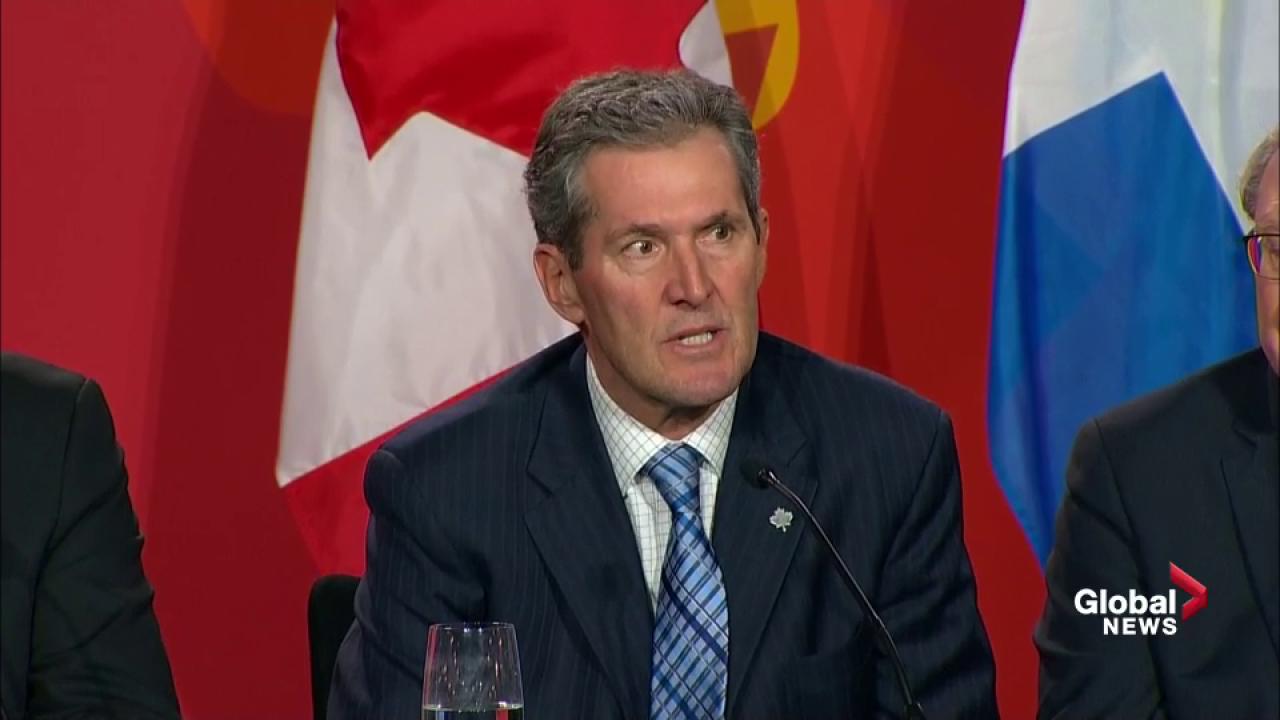Manitoba Premier Brian Pallister pulled aside the premier of Quebec at the provincial leaders’ annual meeting to try to convince him to drop the law against religious symbols.
The two leaders spoke privately on Thursday, the final day of the three-day summit in Saskatoon.
Premier François Legault said the premiers will have to agree to disagree.
“I think what’s happening in Quebec must be under the responsibility of Quebecers and the Quebec premier,” Legault said before the meeting. “That’s it.”
His office did not respond to a request for further comment.
“He has the right to pass that bill and I respect that very much,” said Pallister Thursday at the closing news conference.
- Pallister to push for response to Quebec’s ’dangerous and un-Canadian’ religious symbols law from western premiers
- Alberta’s Jason Kenney tells premiers’ meeting national unity still threatened
The day before Pallister condemned the legislation as “a danger to the freedoms that we value” and said that he feels he must stand up and say it’s wrong.
“And so I have to look at myself in the mirror. That’s not easy anytime with someone with this face, but I am going to stand up against a bill that I think is, to my mind, un-Canadian,” Pallister said on Wednesday.
The majority of the premiers at the Council of the Federation were silent on the issue. Instead, they focused heavily on internal trade, pipeline politics and the carbon tax.
While a handful of premiers criticized the law, no joint statement was made on the subject in the meeting’s final press conference, and there was little appetite to discuss it at the table.
The Post contacted each premier in attendance at the meetings, asking for comment on the law, which is the subject of a court challenge in Quebec.
The legislation covers all religious symbols that might be worn by teachers, police, judges and other public servants, but it has been criticized for targeting Muslims, Jews and Sikhs.
I am going to stand up against a bill that I think is, to my mind, un-Canadian
Ontario Premier Doug Ford said such a law would have “no place in Ontario.”
“Our government is for the people, all the people. As premier, I will always protect an individual’s fundamental rights — including religious freedom and freedom of expression,” said Ford’s statement to the Post.
Alberta Premier Jason Kenney has previously criticized the legislation in the legislature, saying “in Alberta we believe in pluralism and respect for religious freedom, including the right of people to wear the ostensible signs of their religious faith,” but was somewhat more muted in Saskatoon when asked by reporters to comment.
“I’ve expressed my concerns about that bill but at the end of the day that’s a policy of the government of Quebec and it’s not something for us to contest as a government,” Kenney said.
A statement from the office of Nova Scotia Premier Stephen McNeil was also mild in its criticism: “We would not consider similar legislation in Nova Scotia. We are proud to be a welcoming, inclusive province where diversity is celebrated.”
Scott Moe, the Saskatchewan premier and chair of the conference, said “We’re not entertaining or having any discussion with respect to a similar bill in Saskatchewan.”
Sandy Silver, the Yukon premier and Joe Savikataaq, the Nunavut premier, did not reply to a request for comment. Nor did B.C.’s John Horgan or several of the Atlantic Canada premiers: New Brunswick’s Blaine Higgs, P.E.I.’s Dennis King or Newfoundland and Labrador’s Dwight Ball. Bob McLeod, the premier of the Northwest Territories, was en route to home, and his staff could not reach him for a comment.
— With files from Marie-Danielle Smith



























